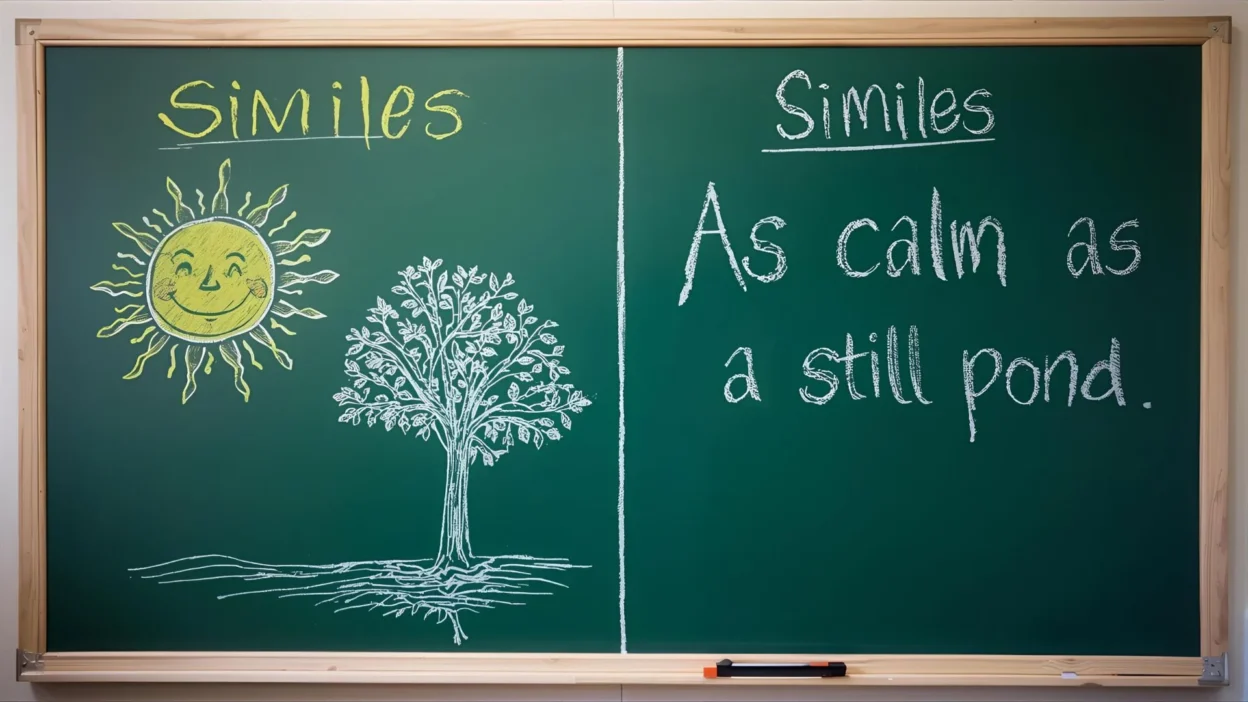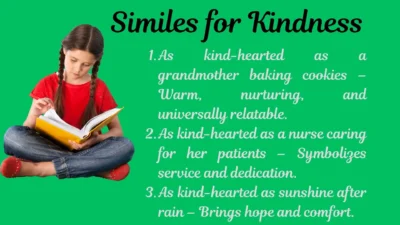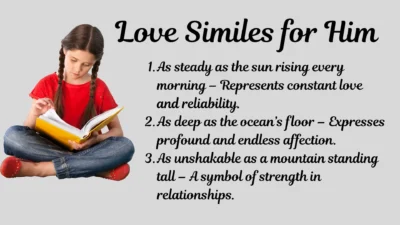Nature has always been a rich source of inspiration for writers, teachers, and students. When searching for similes for nature, people often want expressive comparisons to describe landscapes, seasons, growth, or beauty in a way that feels alive.
This article solves that problem by giving you a wide variety of creative similes—complete with examples, meanings, and usage tips. Whether you’re a teacher helping children learn figurative language, a writer aiming for vivid descriptions, or a student working on an assignment, you’ll find everything you need here.
The Power of Similes in Describing Nature
Similes are more than just “pretty words.” They paint mental pictures, making readers feel the wind, see the sunrise, or hear the rustle of leaves. Using similes, we connect familiar things with natural elements so that even young readers can grasp big ideas.
For example: “The river was as restless as a child who couldn’t sleep.” Instantly, the image is clear and relatable.
In this article, you’ll discover over 35 unique similes for nature, divided into categories with explanations and examples. We’ll also highlight 10 standout similes with deeper insight to make your writing unforgettable.
Simile for Beautiful Scenery
Scenery often needs more than “beautiful” to capture its impact. Similes give your words wings.
- “As breathtaking as a painting come alive.”
Example: The view from the mountain top was as breathtaking as a painting come alive, each color sharper than the last. - “As magical as a dream you don’t want to wake from.”
Example: The lake at dawn was as magical as a dream you don’t want to wake from, shimmering under the soft light. - “As colorful as a box of crayons spilled across the sky.”
Example: The sunset was as colorful as a box of crayons spilled across the sky. - “As serene as a sleeping baby.”
Example: The meadow was as serene as a sleeping baby, untouched and peaceful. - “As dazzling as a jewel in the sunlight.”
Example: The waterfall sparkled as dazzling as a jewel in the sunlight.
6 Similes That Are Found in Nature
These six similes come directly from natural imagery, making them both relatable and poetic.
- “As swift as a river’s current.”
- “As bright as the morning sun.”
- “As quiet as falling snow.”
- “As fragile as a butterfly’s wing.”
- “As tall as an oak tree.”
- “As steady as the mountains.”
Each of these can be woven into everyday writing, helping even children connect language to the world they see.
Nature Similes for Growing
Growth is one of nature’s most powerful metaphors, and similes make it relatable.
- “As steady as a sapling reaching for the sky.”
Example: Her confidence grew as steady as a sapling reaching for the sky. - “As patient as seeds waiting for spring.”
Example: His progress was as patient as seeds waiting for spring. - “As unstoppable as vines creeping up a wall.”
Example: Her curiosity spread as unstoppable as vines creeping up a wall. - “As natural as flowers blooming in summer.”
Example: Their friendship grew as natural as flowers blooming in summer. - “As strong as roots gripping the earth.”
Example: His determination was as strong as roots gripping the earth.
Extended List of Similes for Nature
Here are 20+ more similes, with examples, covering all areas of nature—weather, animals, plants, and landscapes.
- “As calm as a still pond.” – The classroom was as calm as a still pond.
- “As wild as a thunderstorm.” – Her laughter was as wild as a thunderstorm.
- “As gentle as a spring breeze.” – The teacher’s voice was as gentle as a spring breeze.
- “As endless as the ocean.” – His imagination was as endless as the ocean.
- “As refreshing as rain on a hot day.” – The new idea felt as refreshing as rain on a hot day.
- “As pure as mountain snow.” – The child’s smile was as pure as mountain snow.
- “As mysterious as a forest at midnight.” – The old library was as mysterious as a forest at midnight.
- “As fleeting as autumn leaves.” – Childhood felt as fleeting as autumn leaves.
- “As radiant as sunrise.” – Her joy was as radiant as sunrise.
- “As unpredictable as the wind.” – His moods were as unpredictable as the wind.
- “As delicate as morning dew.” – The glass figurine was as delicate as morning dew.
- “As colorful as a field of wildflowers.” – The festival was as colorful as a field of wildflowers.
- “As endless as the sky.” – Their possibilities were as endless as the sky.
- “As fierce as a lion.” – Her courage was as fierce as a lion.
- “As quiet as roots underground.” – His kindness was as quiet as roots underground.
- “As dazzling as stars in the night.” – The fireworks were as dazzling as stars in the night.
- “As soothing as waves lapping the shore.” – The lullaby was as soothing as waves lapping the shore.
- “As restless as leaves in the wind.” – The children were as restless as leaves in the wind.
- “As vast as the desert.” – His loneliness was as vast as the desert.
- “As timeless as the seasons.” – Her wisdom was as timeless as the seasons.
10 Standout Similes for Nature (Deep Dive)
These ten similes go beyond surface description—they create mood, emotion, and connection.
- “As patient as the earth itself.”
– This simile suggests deep endurance, useful when describing someone who waits calmly despite challenges. - “As fierce as wildfire.”
– Captures energy and danger, perfect for emotions like anger or passion. - “As eternal as the stars.”
– Suggests timelessness, suitable for love, memories, or dreams. - “As unpredictable as spring weather.”
– Highlights changeability, great for describing personalities or emotions. - “As nourishing as sunlight.”
– Conveys positivity and growth, excellent for describing relationships or teaching. - “As fragile as ice on a pond.”
– Evokes delicacy, useful in writing about trust or relationships. - “As comforting as a warm fire on a winter night.”
– Brings coziness and emotional warmth, relatable for kids and adults. - “As free as the birds in the sky.”
– Expresses liberation, often used in inspirational contexts. - “As ancient as the hills.”
– A classic simile for something enduring and wise. - “As harmonious as a forest in spring.”
– Suggests balance and peace, perfect for describing unity or beauty.
Metaphor for Nature
While similes use “like” or “as,” metaphors go further, equating one thing with another.
- “Nature is a mirror, reflecting our moods.”
- “The forest is a cathedral, sacred and still.”
- “The ocean is a storyteller, whispering secrets through waves.”
- “The sun is life’s heartbeat.”
Similes and metaphors together create richer, more vivid writing.
Conclusion
Using similes for nature helps children, teachers, and writers turn ordinary descriptions into extraordinary ones.
Whether you’re describing beauty, growth, or mystery, similes connect language with feelings and imagery in a way that captivates readers.
The next time you want your writing to bloom, let these comparisons bring nature to life in your words.




